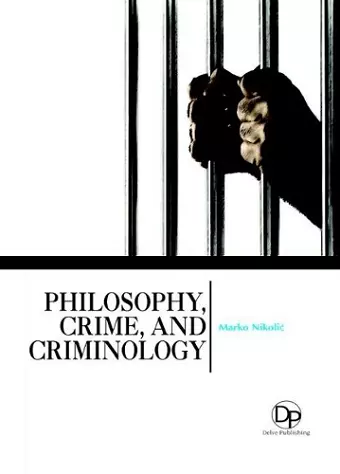Philosophy, Crime, and Criminology
Format:Hardback
Publisher:Delve Publishing
Published:30th Nov '16
Should be back in stock very soon

Philosophy in law, crime and criminology studies questions from the nature of law and legal systems to normative questions about the relationship between law and morality and the justification for various legal institutions. The philosophy of law is usually recognized as jurisprudence. Normative jurisprudence is fundamentally political philosophy, and asks, what should law be? Analytic jurisprudence asks ""what is law?""
Natural lawyers argue that law reflects essentially moral and fixed laws of nature. The concept of ""natural law"" raised in ancient Greek philosophy alongside and in entanglement with the notion of justice, and re-entered the mainstream of Western culture through the writings of Thomas Aquinas and the commentaries of Islamic philosopher and jurist Averroes.
Hugo Grotius, the founder of a purely rationalistic arrangement of natural law, argued that law arises from both a social impulse and reason. Immanuel Kant believed a moral imperative requires laws ""be chosen as though they should hold as universal laws of nature"". Jeremy Bentham and his student Austin, following David Hume, believed that this conflated the ""is"" and what ""ought to be"" problem. Bentham and Austin argued for law's positivism; that real law is completely divided from ""morality"".
Later in the 20th century, H. L. A. Hart argued law is a system of rules, divided into primary (rules of conduct) and secondary ones (rules addressed to officials to administer primary rules). Secondary rules are further divided into rules of adjudication (to resolve legal disputes), rules of change (allowing laws to be varied) and the rule of recognition (allowing laws to be recognized as valid). Two of Hart's students continued the debate: In his book Law's Empire, Ronald Dworkin attacked Hart and the positivists for their refusal to treat law as a moral issue. Dworkin argues that law is an ""interpretive concept"" that needs judges to find the best fitting and most just solution to a legal dispute, given their constitutional traditions.
What justice is and who can make decisions about what is just? Natural Rights, Morality, and the Law is our starting point in Chapter 1 and then we are coming to Holmes and Legal realism, Legal Philosophy, John Austin and Beccaria in Chapters 2,3,4 and 5.
Confession Evidence Strategies are the topic of Chapters...
ISBN: 9781680957921
Dimensions: unknown
Weight: unknown
304 pages